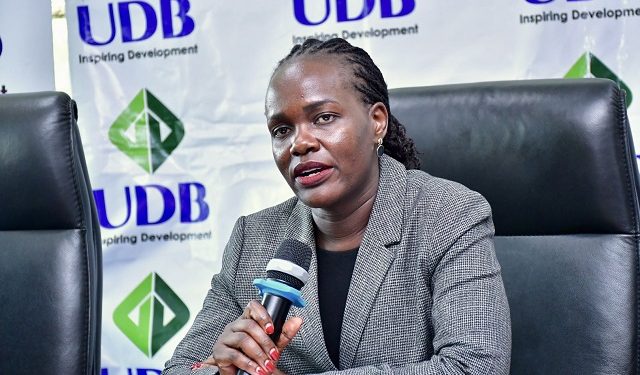By THE INDEPENDENT UG
Kampala, Uganda | THE INDEPENDENT | Uganda Development Bank reports that its total outstanding loan portfolio to Ugandan enterprises rose by 24 per cent to 1.6 trillion Shillings in 2023. The total loan disbursements in the year increased by 21 per cent.
Over the period, some 691 billion Shillings was approved for lending to various projects totalling 201, according to the Bank’s unaudited performance statement for the year 2023.
“During 2023, we delivered a strong set of results, consistent with the performance trend over the last couple of years, and in line with our role as the country’s Development Finance Institution,” said UDB Managing Director Patricia Ojangole.
Of the total approved applications, actual funds disbursed amounted to 610 billion Shillings to various projects across the country.
On the collection of debt, the bank recovered at least 466.5 billion Shillings in loan repayments, which it reinvested to fund disbursements to various enterprises during the year.
Of the total funding, industry, which comprises agro-industry and manufacturing accounted for 59 per cent or 409 billion Shillings, which the bank says shows that it is on course to achieve its strategy to support key sectors. Primary agriculture activities were allocated 19 billion Shillings while 223 billion Shillings was approved to boost the infrastructure sector.
The approved projects are expected to create some 18,558 jobs while generating 11.39 trillion Shillings in additional output value. They are also expected to lead to 615.96 billion Shillings in tax revenue to the Government and 3.3 trillion Shillings in foreign revenue earnings.
To enhance development in the underserved segments of the country including the SMEs, Youth and Women, the Bank continues to effectively implement several strategies dubbed special programs, specifically tailor-made to support their development.
During the reporting period, the Bank approved 22 billion Shillings to support 118 enterprises in the SME, Women and Youth category, and a total of 17 billion was disbursed.
Through its first Private Equity and Venture capital deployed in December 2022, UDB invested another 9.9 billion Shillings and approved an additional 25.3 billion Shillings for innovative startups with high impact in sub-sectors.
These included vaccine manufacture, electric mobility, local paint manufacture, leather value addition, and eco-friendly building materials.
The Bank continued with efforts to ensure that more small and medium enterprises survive into their second year up from the current percentage of 30.
Some of the challenges named include bookkeeping, governance, sustainability planning, access to markets, access to credit, and financial literacy.
“Through our Business Accelerator for Successful Entrepreneurship (BASE) program, we extended business training to more than 500 enterprises across the country in 2023 of which 291 are to be incubated for funding in the year 2024. 61 per cent of the enterprises trained were in the agriculture sector,” Ojangole said in a statement read by Denis Ochieng, Director of Operations.
Under the Bank’s Business Acceleration Program, the Bank says it has supported 40 projects across the agricultural sector (mainly farmer groups) SMEs, Youth, and Women. The supported projects represent about 5,000 that have benefited from business advisory support, which has enabled them to catalyse and further grow their businesses.
“The Bank has to-date committed 5.066 billion shillings towards the preparation of various projects and targeted funding initiatives,” Ojangole explained.
On access to finance by small enterprises the Bank, through a partnership with Ensibuuko, a local FinTech, was able to digitize more than 112 farmer groups.
These represent, more than 700 farmer-beneficiaries, who, the Bank says, have been able to access digital microloans ranging from half a million to 3.5 million shillings, with 500 million disbursed to farmers in this segment.
The Bank committed 50 billion shillings towards the capitalization of the Climate Finance Facility, this facility. This is a special-purpose vehicle with a unique and specific focus on financing, unlocking, and catalyzing private sector investment in local green sectors that drive green impact and financial inclusion.
The beneficiaries also have access to the Bank’s Green Advisory as well as the Project Preparation Support “to make them bankable but more importantly grow them to become viable green businesses,” said Ochieng.
UDB releases 2023 performance with several new targeted funding initiatives towards the private sector and green economy
The Bank says it is striving to meet the growing demand, especially for long-term credit as economic activity spirals from the downturn of the COVID-19 Pandemic.
The statement further shows that both capitalization and funding towards the Bank grew, as the government sank in more money.
“The Bank’s funds inched up year-on-year by 12 per cent, from 1.23 trillion to 1.38 trillion shillings, attributed to capital Injections by the government during the period”.
In a bid to expand its footprint across the country, UDB set up the first regional office in Gulu City in 2023, to act as a liaison point for all the districts that constitute Northern Uganda.
This will be followed by regional offices in Mbale for Eastern Uganda, Hoima for the mid-west region, Arua for West Nile and Mbarara for Western Uganda.
******
URN
The post UDB: Approved loans to create 18,500 jobs appeared first on The Independent Uganda:.







Discussion about this post